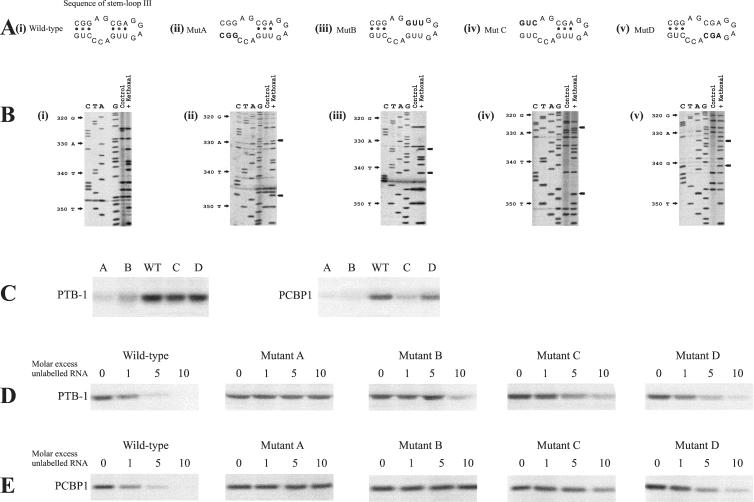FIG. 4.
Mutation of PCBP1 and PTB-1 binding sites inhibits interaction of the Bag-1 IRES RNA with these proteins and affects the activity of the IRES in vitro. (A) Stem-loop III of the Bag-1 IRES (panel i) was mutated to create mutants A, B, C, and D (panels ii, iii, iv, and v, respectively) to alter the PCBP1 and PTB-1 binding sites and generate a structure where the RNA would be in a more open conformation. (B) Chemical probing of the Bag-1 IRES (panel i) and of the mutants A, B, C, and D (panels ii, iii, iv, and v, respectively) to identify residues which are differentially modified in the response to the loop-opening mutations. No other residues outside of this region showed any alterations (data not shown). (C) Radiolabeled RNA was generated from DNA encoding wild-type Bag-1 IRES or mutant A, B, C, or D by in vitro transcription. This RNA was then incubated with 0.2 μg of either PTB-1 or PCBP1, exposed to UV light, and then treated with RNases. The products of these reactions were separated on sodium dodecyl sulfate-10% polyacrylamide gels. The data show that the mutant versions of the IRES exhibit reduced binding of both PCBP1 and PTB-1 with mutants A and B, PCBP1 did not bind to mutant C, and mutant D had a much smaller effect. (D) UV cross-linking competition analysis was performed by incubating PTB-1 with radiolabeled wild-type Bag-1 IRES RNA in the presence of increasing amounts of unlabeled mutant A, B, C, or D IRES RNA. The data show that mutant A does not compete for binding with PTB-1 and that mutant B affects the binding of PTB-1 to the wild-type sequence only at a 10-fold molar excess. However, mutants C and D compete only slightly less well than does the wild type. (E) UV cross-linking competition analysis was performed by incubating PCPB1 with radiolabeled wild-type Bag-1 IRES RNA in the presence of increasing amounts of unlabeled mutant A, B, C, or D IRES RNA. The data show that mutants A, B, and C do not compete for binding with PCBP1. However, mutant D competes only slightly less well for binding than does the wild type.

